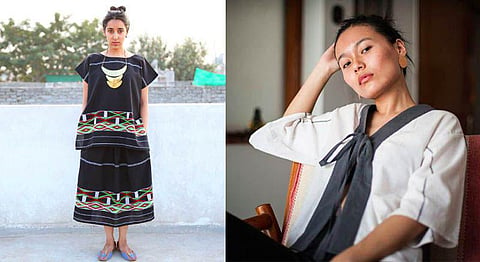
- HOMEGROWN WORLD
- #HGCREATORS
- #HGEXPLORE
- #HGVOICES
- #HGSHOP
- CAREERS
- ABOUT US
- CONTACT US

Two things are happening simultaneously across India’s fashion landscape. Global fast fashion brands like H&M and Zara continue to capture market share (with stores mushrooming in the country’s metros), against the backdrop of the slow but steady rise of independent fashion houses and ethical fashion labels. Whether it’s an enterprise that’s using banana fibre to make jeans, an indie label that’s turning the plastic from our oceans into swimwear, innovations with Khadi Denim or ones that are creating cruelty-free leather products, Indian designers are shouldering the responsibility of making fashion sustainable together.
One such initiative is the North East Project (NEP) which describes itself as an “endless improvisational jam session between some of the most forward-thinking fashion houses in India and the brilliantly-imagined textiles from North-East region.”
Crafting a wide range of products from apparel to home-furnishings, NEP is deeply rooted in the cross-section of lifestyle, luxury and social impact. We spoke to the man behind it all, NEP founder, Harjoth Singh to understand how his brand shapes and sustains this unique ethos.
“I remember looking at scarves and table mats woven by rural North-Eastern weavers, they had such intricate designs and key detailing. I saw the immense potential of these products which had no obvious market linkages,” says 37-year-old Singh, a former investment banker in Europe. On further contemplation, Singh decided to experiment with using traditional textiles to make high-value finished goods in collaboration with designers. “This was the specific moment that triggered NEP,” he explains.
Today, majorly retailing through their online store, NEP’s unique aesthetic is fuss-free European silhouettes that integrate the Eastern ancient world. A striking creation of their sensibilities is their crimson pencil skirt which is made in Mizo handloom fabrics and adorned with an ethnic sash as the minimalist styling element.
“The designers we work with find inspiration in the unique ethnic North-Eastern textiles that we use in all our products. For this they often step outside the boundaries of their own design templates and styles,” says Singh who works with a select group of designers that innovate through re-imagining traditional textiles.
Another important aspect that Singh considers when picking designers to collaborate with NEP is that they must resonate with its core value – giving back to the society.
Between creativity and innovation, NEP still stays strong with their ethics. “We don’t haggle with rural weavers. Instead, we ensure that our policy of zero-wastage naturally results in the maximum value of finished goods being created by the cloth. So the better the end-product designs, the more value we can make from the textile and the more we can return to artisans,” states Singh, explaining how NEP aligns itself with the sustainable fashion movement while also augmenting the income of local artisans, the guardians of dying ancient crafts.
For those who are sceptical of ethics proving to be a sustainable business model, NEP has emerged triumphant. With an entrepreneurial spirit of ‘empathy’ and ‘embracing non-linearity’ NEP has also been able to penetrate the mainstream style culture.
“We have had various style icons appreciate our products (whether they wear it, or feature them on their social media,” he confesses.
In the coming years, NEP is looking at exploring diverse avenues through supporting other high-quality creative initiatives from the North-East as well as looking at international collaborations.
While Singh feels that NEP, which is still a startup, has “yet to achieve its biggest milestones,” we do beg to differ slightly. That is because, since its very inception in 2014, this fashion collective made a revolutionary move - turning the spotlight on the creative genius of the Seven Sister states, a region which is highly underrepresented by its own country.
If you enjoyed reading this article we suggest you read: A Zero-Waste Indian Clothing Brand Is Putting An End To Fast Fashion
